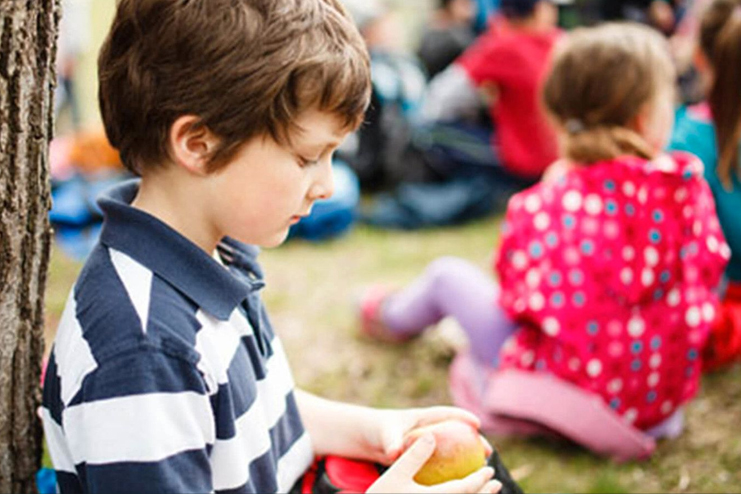The world keeps changing constantly and the parents are learning to bring up their kids as per the outgoing dynamic society but, it’s not the same for every child. As the children grow, they might encounter many behavioral problems. It is more important to recognize any behavioral change in the child and intervene at the right stage to prevent any further negative impacts.
Introvert unlike shyness has both positive and negative side. A complete view of the introvert child is required to let your kid come out of it. Introverted child does not want to participate in the social engagements as they make them feel exhausted and drained. There are many questions that surround the parents of introvert child.
How to know that child is introvert? What make them to be introvert? Are introverts intelligent? Scroll down to find the answers and know more about the introvert child.
Who is an introverted child?

Though the child is socially skilled, being an introvert, they like to be alone or do the quitter things or to hang out with one or two friends at home. They more often seem reserved and hesitated. Introverted child is neither assertive nor enthusiastic in highly stimulative social situations.
Many introverted children are not depressed or anxious. Introverts prefer their own thinking is the best way to cope with the world. The good thing about the introverts is that they work deeply into the things they choose to focus on.
Sometimes, it is difficult to know that you have an introvert child. Many parents mistake introvert for shyness and go with different statements.
Here is how you can say that your child is introvert:
• Exposure to the lot of activities and noises may make your child more exhausted.
• You kid may feel more conscious and uneasy in the presence of strangers.
• Sometimes, they may struggle to express their emotions and feelings that makes you to pause during the conversation searching for the right word.
• Studies show that premature and low birth weight babies are more vulnerable to become introverted as they grow up.
• Your child may love to live in their own world
Characteristics of the Introverted children:

Here are good qualities that your introverted child holds:
• They are the good communicators and listeners
• They have high levels of self awareness
• They can learn things through the good observation
• Remain quiet in the large social setting
• They have the ability to concentrate deeply
• Inner reflections are their primary preference
• They can select the activities carefully and thoughtfully.
• They create their own room where they engage with the deeper aspects of the life.
• They observe the things before reacting
• They follow their own values to make the decisions
Difference between Introverted and shy child?
Although these two qualities look the same, being the introvert is different from being shy. In fact, being more sensitive is one of the characteristics of the introvert, these two are not the same. An introvert enjoys to spend the time alone and they may get drained after spending a lot of time in the parties. They feel it stressful to be with the others. Introverted child prefers to spend time alone doing some solitary things like reading, drawing, or playing computer games.
A shy kid on the other hand regret to join the groups with the fear and lack of social skills. Children can get a therapy to overcome shyness, but there is no treatment for the introvert child. Introverts can learn the coping strategies on their own.
Introverted Vs Extroverted children:
Here are a few characteristics of extroverted child in contrast to the introverted child:
Talk with the loud voice, even if they are nervous.
Switch subjects more frequently
Have the ability to sound like an expert in the specific subject even if they are not
Can stand close to the person they are talking to
Very good at some expressive gestures associated with the face, hands, or body while talking.
Can have more friends and dive into the new situations quickly
Can consider social activities as the opportunity to charge themselves.
Challenges of Introvert child:

All the children have different personalities and the behaviors and you cannot judge them based on their behavior. Being an introvert, your child may feel it difficult to express their feelings, challenges, and problems freely. Try to understand their challenges and help them cope with them effectively.
Here are a few challenges that your introverted child that your introverted child may encounter:
• An introverted kid may feel it difficult to contribute their ideas within the groups.
• Being a part of large groups may make them feel inconvenient as they can get along only with a few people.
• Making your kid to attend camps or workshops may make them feel overwhelmed as they need to interact with the new friends.
• Shifting your child to a new school might offer them difficulty in finding new friends.
• Taking part of the back to back or long activities might be difficult for the introverted child.
• Making friends and maintaining the relationships might be difficult task for the introverted child.
Mistakes parents make with an Introverted child:

Most of the parents get themselves into the confused state while dealing with the introverted child, if they are not introvert themselves. The problem arises when the extroverted parents fail to understand the introverted child.
Here are a few things that you should not do to introverted child:
1. Embarrassing your child:
Some parents have the jokey personality and they like to poke fun at their kids with the intention of making it a fun. But the introverted child fails to catch the humor in this type of interaction and may feel themselves ashamed.
2. Forcing your child to have the discussion with others:
Every parent wants their kid to be active at the social activities. But, forcing them to talk with others may not yield good results and it does not work at all. Introverted child needs comfortable environment to open up. They take some time to observe the things and people around and pushing them to talk too soon may make them to withdraw completely.
3. Target your child in front of others:
This is the biggest mistake that most of the parents do. If your child forgets to do something or say something don’t blame or scold them in front of others. Because, introverted are very conscious and get embarrassed over the things.
4. Talk for them:
Whenever your child is asked something don’t take the turn to answer for him. This makes them feel shy. Give your child some space to talk for them.
5. Overscheduling:
Abundant of activities may make your child overwhelmed. An introverted child requires more down time. They do not too much of stimulations and require sometime to recharge their batteries.
6. Planning back to back activities with no time gap:
Planning the day full of many activities may make your introverted child experience the depletion of the energy. Think of the energy levels of your introverted child before you plan the activities. Allot some down time in between the activities. For the introverted child, home is the energy station where they recharge their batteries.
7. Disclose the personal information in front of other people:
Talking the silly things about your child may not be big deal for you. But, it may make your child feel ridicule. Introverted children perceive even the more common facts as personal and private.
How to raise an introverted child?

We are living in a world that is constantly gearing towards extroversion. Introversion is the foundation that your child wishes to see and learn about the world. The thumb rule to help the introverted child is to let them learn to work with their strengths. Here are a few points:
1. Accept that your child is an introvert:
The first and the foremost hurdle that you should jump over is to know and accept that your child is an introvert unlike the conventional social butterfly. The fact to know that their children are more quiet can drive many parents to the point of distress. Even though they are good at social skills, they will take some time to observe the things before they join with the friends at the social events or parties. They think before they speak.
If you accept this basic trait of your child, then you can push them to participate in the social activities more without disturbing their comfort levels.
2. Never force your child to be an extrovert:
Many parents force their introvert child to interact with others making them to step out of their walls of comfort. The forceful interactions may make your child to lose their Genuity. The potential thing to know about the introverts are they are more empathetic and interpersonally more connected.
3. Support your Introverted child:
This is one of the best ways of raising introverted child. If you are an extrovert, it is more challenging for you to support your introvert child at home. The following things will help you deal with your introvert child:
• Allow the private space for them as their room is their heaven.
• They require more quiet time throughout the day to recharge their own batteries.
4. Give some time for your child to relax:
Provide some free time for your child to wind down when they are exhausted after social activities. Let them to spend some time alone. Especially moving from one social activity to the other can make your child a bit cranky and stressful.
Allow your introverted child to have some privacy as they recharge through the solitude and need some time to process what they observe.
5. Work with their strengths:
Instead of forcing them to join in some activities take some time to talk with them and know their interests. Encourage them to do something in line with their abilities and strengths. This yields favorable results. For instance, some may excel in the individual sports instead of team sports.
6. Respect the preferences of your child:
Once you understand that what introvert exactly mean, understand the preferences of your baby. Respect the preferences once you recognize them. For instance, if your child has very few friends, then you need worry about it or make the efforts like arranging play dates to help them make more friends.
If you recognize that your kid is most happy with just few friends, it is not all the indication of any problem. Give your freedom to take lead over their decisions and preferences.
7. Let your child to celebrate their uniqueness:
Appreciate your child for their uniqueness and the talents. Let them recognize their ability to listen, focus, observe, and communicate. You can give them the examples of some famous introvert personalities.
8. Prepare your child for the social interactions and the new situations:
When you know that you are going to face the situation that make your child stressful, try to make them well prepared beforehand. Talk to them about the events you are going to attend like number of people, duration of the party etc. Respect the feelings of your child and let them lead their decisions.
9. Introduce the new situations to your child at a slow pace:
This is one of the best ways to deal with introverted child. Try to help your child face the new situations slowly. If you are attending a party, try to be there before the start time so that your child will get some time to adjust and meet the new kids comfortably.
Patience plays a prominent role while dealing with the introverted child.
10. Tell your child a story from your childhood:
Kids love stories. So the stories are the best way to approach them with the concepts that relate to them. Share the stories about the struggles that you encounter in the childhood and how you overcome them.
11. Analyze the day of your introverted kid:
Going to school may be the battery draining activity for your introvert kid. The best place for them to recharge their mind is home. They may not want any other activity after the school. Give your child some physical and mental space to recharge their batteries and make them ready for another activity.
12. Talk to your child’s teacher about your introvert child:
Talk to your child’s teacher about your introvert child and ask them to explore the ways to help your child. The technique of think, pair, and share will help other introverts of the class to cope well and articulate their ideas.
Give the children some topic or question and ask them to think independently, then divide them into small groups of two to three to discuss and let this small group to share their ideas to the remaining students. It is a great rehearsal for the introvert children.
13. Schedule games and role plays with small groups:
Allow your child to participate in the games and role plays with small groups that help them to handle different situations. These activities will help them to ease the levels of their anxiety. Games are the best way to teach your kids how to approach and handle the new people. It also makes your children well prepared to face the different social situations that they face.
14. Don’t try to solve the problems for your child:
Parents always try to clear the hurdles in the path of their children and make the things easy for them. But, doing this way harms your child. When you solve the problem for your child, you never explain them the way how to solve it. They should learn to solve the problems their own as we are not going to stay with them always.
Set boundaries yourself on to what extent to help them. Create a friendly environment for your child and let them to discusses their problems and their own opinions to solve them. This helps your child to ensure that they are in the safe zone and it boosts their confidence levels.
15. Get your family support:
Be sure that your family get the whole thing about the introvert/extrovert child. Seek the support from your partner and the other family members to bring out your introverted child and help them to make out their best.
16. Find out some special activities for your child:
Try to find out the ways and activities that can turn into recharging activities. Make your child to listen to some soothing music and exercise early in the morning in the pleasant home environment.
Activities for Introverted child:

The internet and the technology have facilitated platform for the introverted child to explore and showcase their skills. Here are a few activities to bring out the best in your introverted child:
1. Story Writing:
Allow your child to write some creative stories. Writing is one of the solitary activity which most of the introvert and the shy children like. Make this activity social by enrolling your child in the creative writing class. Let your child to discover their passion.
2. Pet training:
Pets are the best friends for many introverted kids. Allow your child to train their pets. A friendly pet will help your kid to navigate their emotions. If your child likes pets, get them one for their wellbeing.
3. Volunteering:
Let your child contribute for the society. Make your kid to sign up as a volunteer in some activities that are not too social. Your introverted kid can volunteer in the library in sorting out the books in a quite calm environment.
4. Encourage art:
All kinds of art including paint, sculpt, and crafts can be both fun and creative. Allow your child to express their emotions and the feeling through the art.
5. Solo sports:
Involve your child in some solo sports as the team sports may be overwhelming for your child. Swimming, tennis, and karate are the best games.
How to discipline an introverted child?

The discipline traits may vary as per the personality of your child. The response of introverted child to the discipline may vary when compared to their extroverted sibling.
Here are some techniques that you can use to discipline your Introverted child:
1. Let your child realize their mistakes
Instead of asking your child the question like answer me, use the above phrase. Just because of the reason that your child is quiet or not responding to the cues immediately, do not make yourself assumptions that he is lying or ignoring you.
2. Don’t assume that time out is always the answer:
Your child is introvert does not mean that they do not want to be heard. Locking them in a room may not bring out any change in the behavior. No one enjoys being alone.
3. Have them develop a plan themselves:
Introverts are clearly aware of their feeling and calling them out might make them feel shame. Allow your child to develop a plan for what they want to do for the next time.
4. Don’t be afraid to share your experiences:
Introverts may not be able to open up or share their feelings. They are greats listeners who tend to make a note of the experiences and the mistakes. Provide a safer and friendly environment for your child to learn, share and get out of their mistakes.
In conclusion, raising an Introvert child is a bit challenging and difficult for the extrovert parents but the one thing that you have to understand is that they need love, affection, and understanding. You don’t have to be an introvert to successfully parent your introverted child. Take some time to move along their boundaries and cues and move along helping them.










































